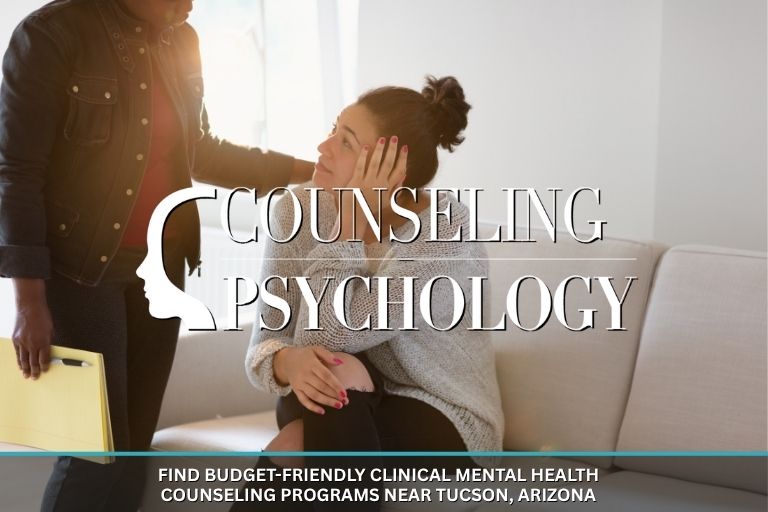Find Budget-Friendly Clinical Mental Health Counseling Programs Near Tucson, Arizona

Tucson, Arizona, nestled in the Sonoran Desert and home to more than half a million people, has steadily become a hub for affordable mental health counseling education. With the region facing a growing demand for licensed mental health professionals, especially in underserved and rural communities, many aspiring counselors are looking for practical ways to enter the field without incurring heavy student debt. According to the Arizona Office of Economic Opportunity, demand for behavioral health professionals is expected to grow significantly across the state, further underscoring the importance of accessible training pathways. Fortunately, Tucson offers a range of accredited, cost-conscious graduate programs that pave the way to licensure in Clinical Mental Health Counseling (CMHC).
Whether a local professional is seeking career advancement or a recent graduate is exploring options in Tucson’s vibrant academic and healthcare landscape, this guide outlines affordable, accredited options, as well as what to expect from tuition, curriculum, financial aid, clinical opportunities, and long-term career outlook.
2026 Budget-Friendly Clinical Mental Health Counseling Programs Near Tucson, Arizona
University of Arizona
Tucson, AZ - Public 4-Year - arizona.edu
Master's - Master of Arts in Counseling (Clinical Mental Health Counseling)
Campus Based - Visit Website
University of Arizona's Master of Arts in Counseling offers an affordable clinical mental health counseling pathway with strategic advantages. The CACREP-accredited program minimizes student expenses through potential graduate assistantships and in-state tuition rates. Located in a cost-effective urban environment, students benefit from comprehensive training emphasizing multicultural competence and ethical practice. The program's clinical mental health concentration provides extensive practical experience across diverse settings, preparing graduates for professional licensure. With a focus on social justice and personal empowerment, the curriculum develops advanced intervention skills while maintaining budget-conscious educational strategies. Military-friendly status and potential financial aid further enhance the program's accessibility for aspiring mental health counselors.
- CACREP-accredited program
- Clinical Mental Health focus
- In-person campus program
- Licensure preparation
- Diverse practice settings
- Multicultural competence training
- Ethical counseling practices
- Social justice emphasis
- Professional counselor certification
Why Choose Tucson for Clinical Mental Health Counseling Education?
Tucson blends a lower than average cost of living with access to reputable universities and clinical training opportunities. The city’s proximity to underserved populations, including tribal communities and rural counties, makes it a prime training ground for future counselors committed to equitable mental healthcare. Students benefit from both urban clinical experiences and placements that focus on serving marginalized groups with limited access to care.
Local partnerships between universities, nonprofits, and public health agencies provide robust practicum and internship opportunities. Institutions like the University of Arizona and local branches of national universities offer clinical placements throughout southern Arizona, often with a focus on culturally competent care and bilingual counseling services. The city also has a strong network of community-based clinics, school districts, and behavioral health nonprofits that regularly host counseling interns and employ graduates.
Tucson's educational environment is further supported by public investment in behavioral health infrastructure, including initiatives led by the Arizona Health Care Cost Containment System (AHCCCS) and Pima County Health Department, which frequently collaborate with training programs to develop the future counseling workforce.
Scholarships and Financial Aid Opportunities
Affordability isn't just about sticker price. Many Arizona counseling schools offer institutional scholarships, Arizona-specific tuition waivers, and practicum placements that include stipends or employment. These opportunities help students focus more on learning and less on accumulating debt.
- Arizona Teacher Academy Scholarships: For students committing to work in Arizona public schools post-graduation
- Graduate Assistantships at UA: May cover tuition and provide monthly stipends in exchange for research or teaching support
- Western Regional Graduate Program (WRGP): Allows students from 16 western states to pay in-state tuition at participating universities in Arizona
Students are also encouraged to apply for national counseling scholarships from organizations such as the NBCC Foundation and the American Counseling Association Foundation. These external awards not only provide financial relief but also serve as professional recognition that can strengthen future job applications.
In addition to institutional aid, Tucson’s community-oriented organizations often provide support for students committed to local service. For example, the Arizona Counselors Association periodically offers grants and conference scholarships. Additionally, mental health employers in Tucson, including community health centers and behavioral clinics, may offer tuition reimbursement programs for graduate students who commit to working locally after licensure. Some agencies, like La Frontera Arizona and CODAC Health, Recovery & Wellness, offer professional development stipends or onboarding bonuses for graduates from local programs.
Several universities also offer need-based emergency grants or technology assistance funds for students juggling school with financial hardship, especially those returning to graduate school mid-career.
Licensure and Career Outlook in Arizona
Graduates of clinical mental health counseling programs in Tucson must meet Arizona Board of Behavioral Health Examiners (AzBBHE) requirements to become Licensed Associate Counselors (LAC) and eventually Licensed Professional Counselors (LPC). This licensure process ensures that professionals are well-prepared to address a wide range of mental health issues in diverse populations.
To be eligible for licensure, candidates must:
- Complete a master's degree in counseling or a closely related field (minimum 60 graduate credits)
- Complete 100 hours of supervised practicum and 600 hours of internship
- Pass a national exam (NCE or NCMHCE)
- Accumulate the required number of supervised post-graduate clinical hours
Arizona Counseling Licensure Requirements
| Requirement | Description |
| Education | 60-credit master’s in counseling or related field |
| Practicum | 100 hours supervised |
| Internship | 600 hours supervised |
| Examination | Pass NCE or NCMHCE |
| Supervised Experience | Post-grad supervised clinical hours (varies by setting) |
Arizona’s expanding need for mental health professionals is reflected in recent job projections. According to the Arizona Office of Economic Opportunity, employment for substance abuse, behavioral disorder, and mental health counselors is expected to grow more than 25% through 2030. This trend is fueled by a statewide focus on improving access to care, integrating behavioral health in primary care settings, and addressing the mental health impacts of social and economic stressors.
Counselors in the Tucson area serve in diverse settings, from K-12 schools and colleges to veterans' centers, tribal health organizations, crisis lines, and nonprofit clinics. There is especially strong demand for professionals trained in trauma-informed care, bilingual counseling, substance use treatment, and telebehavioral health services.
Graduate students in Tucson often find it possible to begin part-time work in the field before full licensure, gaining experience as behavioral health technicians, intake specialists, or case managers. These roles can help fulfill supervised hour requirements while also building meaningful relationships within the local professional community.
Tips for Choosing the Right Program
Not all affordable counseling degree programs are created equal. Consider the following when narrowing your search:
- Licensure Alignment: Confirm that the curriculum aligns with Arizona's LPC requirements and meets CACREP or equivalent accreditation standards
- Format Fit: Ensure the program's structure (online, hybrid, evening, or full-time) matches personal responsibilities and learning style
- Local Partnerships: Look for programs with established ties to Tucson clinics, schools, and public agencies where internships and job leads are more accessible
- Faculty Expertise: Review faculty credentials and areas of specialization, especially in multicultural counseling, ethics, assessment, or addiction
- Support Services: Consider academic advising quality, supervision availability, and access to licensure exam prep, job placement assistance, and alumni networks
Prospective students should also ask about graduation and licensure pass rates, as well as the program's reputation among local employers. Attending information sessions and speaking with current students or recent alumni can provide valuable insights into each program's strengths and limitations.
Launching a Counseling Career in Tucson
With accessible education pathways and a strong professional need, Tucson is a promising place to launch or advance a counseling career. Many graduates remain in the region to serve local populations, often securing jobs even before licensure is complete. Programs that emphasize community engagement and applied experience prepare students to hit the ground running.
Mental health providers in Arizona are actively working to reduce the stigma around seeking care, particularly in rural and Spanish-speaking communities. Bilingual graduates and those with a passion for serving historically excluded populations may find especially meaningful and stable employment opportunities. In fact, bilingual counselors in Tucson often receive salary incentives or preference in hiring for roles in schools, hospitals, and government-funded agencies.
Building connections with local professional organizations, such as the Southern Arizona Psychological Association or the Arizona Counselors Association, can help new graduates find mentorship, continuing education, and job opportunities more quickly. Participation in statewide conferences or local networking events may also lead to clinical supervision opportunities and long-term career mentorship.
Whether remaining in Tucson long term or using it as a launchpad for service elsewhere in Arizona or the Southwest, a budget-friendly CMHC degree from a local institution can be a strategic step toward a rewarding, community centered career in mental health counseling.
Sources
- Arizona Board of Behavioral Health Examiners
- Arizona Office of Economic Opportunity
- National Board for Certified Counselors (NBCC)
- American Counseling Association
- Arizona Counselors Association
- La Frontera Arizona
- CODAC Health, Recovery & Wellness



